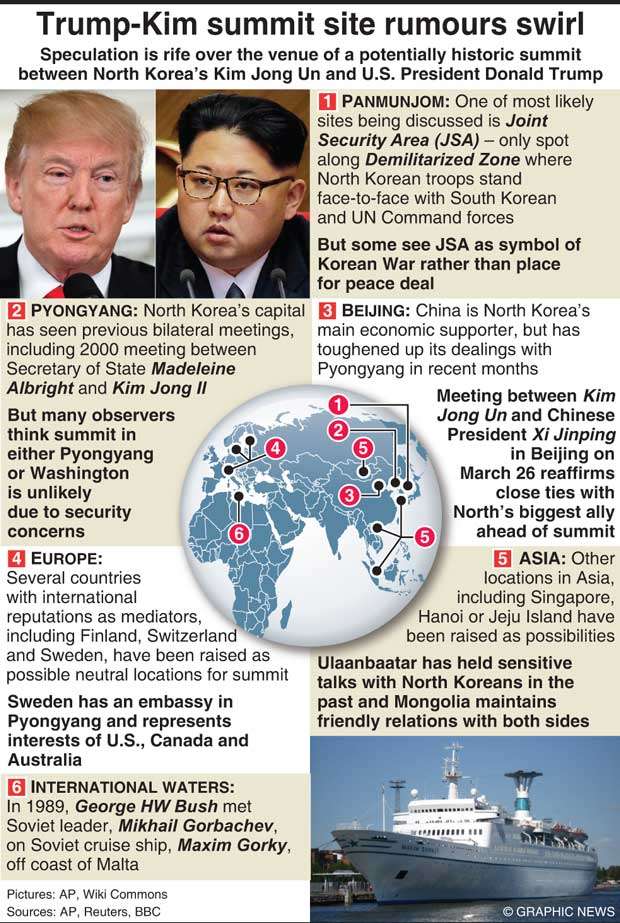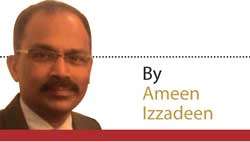Where goes Korea after the crucial talks?

When Donald Trump after his 2016 election victory met President Barack Obama in the White House, the outgoing President in a parting advice to Trump said: North Korea should be a foreign policy priority.
Obama tried to work out a summit meeting with North Korean leader Kim Jong-un but due to opposition from the conservatives, both in his Democratic Party and the opposition Republican Party, he had to abandon his plans. Maybe it was too much for Obama, for he had spent much of his bargaining power on normalising ties with Cuba – a demanding task just as tough as normalising ties with North Korea. In 2015, Obama not only established diplomatic ties with Cuba after 54 years, but also visited Cuba and sat together with Cuban President Raul Castro to watch a baseball match between the Cuba national team and an American Major League team. Obama’s diplomatic triumph was a shocker and belatedly justified the awarding of the Nobel Peace Prize to him.
But now Trump, who has often scoffed at Obama for his failure to deal effectively with North Korea, has pulled out a similar shocker. If nothing untoward happens, Trump will meet North Korea’s leader Kim Jong-un by the end of next month or early June at a place yet to be named. The two leaders together with South Korea’s President Moon Jae-in could even share this year’s Nobel peace prize.
Certainly, much of the credit should go to President Moon Jae-in, a liberal politician, who dreams of Korean unification. Moon was a supporter of the Sunshine Policy former South Korean President Kim Dae-jung formulated to unite the two Koreas and improve the combined economy. With Trump-Kim rhetoric taking the world to the brink of nuclear war in August last year, Moon feared for the safety of millions of South Koreans. The Winter Olympics in February helped him revive the Sunshine Policy. He urged North Korea to send a strong athletics delegation to the Games.
North Korea did respond favourably, sending not only a powerful athletics team which took part under the banner of unified Korea in some events, but also sent Kim Yo-Jong, the elegant sister of Kim Jong-un to the Games village in Pyeongchang. In official events connected with the Games, Kim Yo-Jong was seen in the presence of US Vice President Mike Pence. Moon meets Kim today at a border village.
Whether or not Trump succeeds in persuading Kim Jong-un to dismantle North Korea’s nuclear programme, the ice has been broken. It was only in August last year that a nuclear war between them seemed a possibility. This was after North Korea test-fired a series of long-range missiles that could hit any part of the United States and reports appeared in the US media that North Korea had successfully developed miniature nuclear warheads that could be fitted into the missiles.
Reacting to the developments, Trump issued a doomsday warning in a twitter message: “North Korea best not make any more threats to the United States. They will be met with fire, fury and, frankly, power, the likes of which this world has never seen before.”
In response, North Korea said it would send a salvo of four missiles over Japan and towards the US territory of Guam and mocked Trump as a man “bereft of reason”.
In October last year, Trump in another tweet mockingly called Kim Jong-un “A little Rocket Man”. But on Tuesday, Trump hailed the North Korean leader as a “very honourable man”. The change probably underscores the maxim that in politics, there are no permanent friends or foes, but only permanent interests.
Permanent interests apart, the turn of events also goes well with Trump’s re-election campaign. On the one hand, the North Korea turnaround – Chinese media reports say North Korea suspended nuclear tests due to the collapse of its testing site -- has given Trump a magician’s wand to divert the American people’s attention away from the Russia probe and bad publicity over his alleged affairs with porn stars and playmates. On the other, he emerges strong as a President who has tamed North Korea, a President who does what others cannot do. He apparently knows how to keep his vote bank intact.
Trump hailed the North Korean leader as a “very honourable man”. The change probably underscores the maxim that in politics, there are no permanent friends or foes, but only permanent interests
Given Trump’s style of crisis management, one can safely assume that he has got an assurance of sorts from Kim Jong-un during the secret meeting between the North Korean leader and Trump’s envoy Mike Pompeo, the secretary of State-designate, earlier this month. In a concession to the US, North Korea has indicated that it will not ask for the withdrawal of US troops from South Korea.
Now this raises serious geopolitical issues. If the Moon-Kim and Trump-Kim talks lead to a peace treaty between the two Koreas and eventually unification, it will be a big victory for Washington’s China containment policy.
But China is unlikely to let go of North Korea to the US camp, without a fight. For China, North Korea is a vital part of its geostrategic plan. Apart from Russia, North Korea is China’s only ally in the East Asian region where China feels it has been surrounded by US military bases. From China’s point of view, a unified Korea should, at best, be pro-China and, at worst, be neutral. It is naïve to assume that the North Korean leader was acting without informing China first. What else would he have discussed with China’s President Xi Jinping after he made a secret train journey to Beijing in March other than the geopolitics of the upcoming meetings with Moon and Trump?
What is at stake at Kim’s meetings with Moon and Trump is the issue of North Korea’s nuclear weapons and missiles. Severely affected by international sanctions, North Korea is struggling to maintain a multibillion dollar nuclear programme and look into the basic needs of its 25 million people at the same time. It badly needs an economic takeoff. It apparently feels the time is now.
But can North Korea agree to Trump’s demand that it dismantle its nuclear arsenal? Knowing well that nuclear weapons can deter big power invasions, Kim is unlikely to say yes. He may agree to re-enter the Nuclear Non-Proliferation Treaty or to a gradual dismantling of the nuclear arsenal but conditional upon certain measures the US will have to take. Such a scenario once again takes us to the six-party talks that went on from 2003 to 2007. Apart from North Korea and the US, the other countries involved in the discussions were China, Russia, Japan and South Korea. But largely due to the US failure in fulfilling its part of the deal, the talks collapsed, leading to North Korea emerging as a full-fledged nuclear state.
Given the geopolitics of the issue and Trump’s ambitions, the breakthrough lies in efforts to work out a win-win formula for not only North Korea, the US and South Korea, but, more importantly, also for China.


